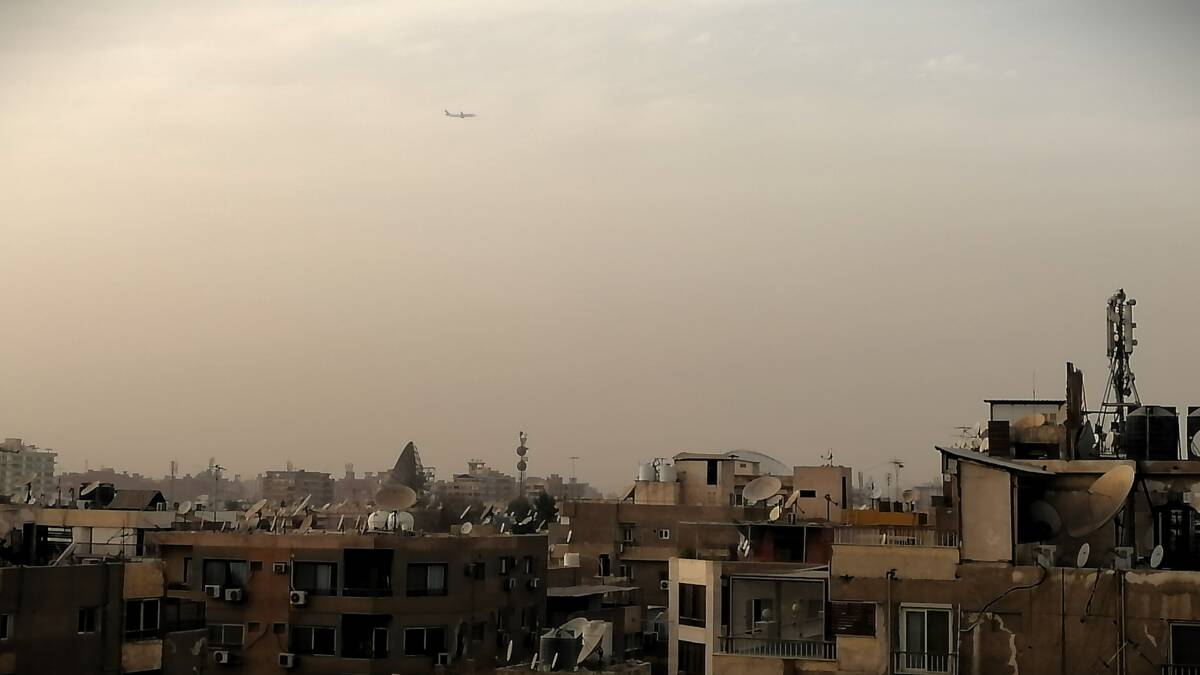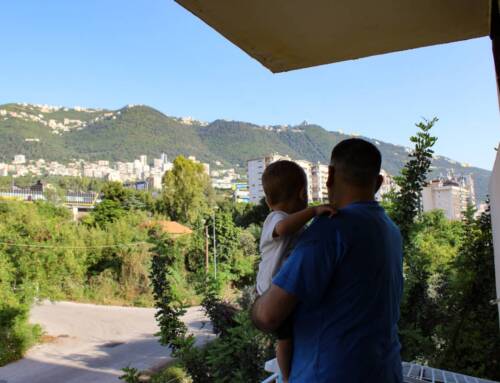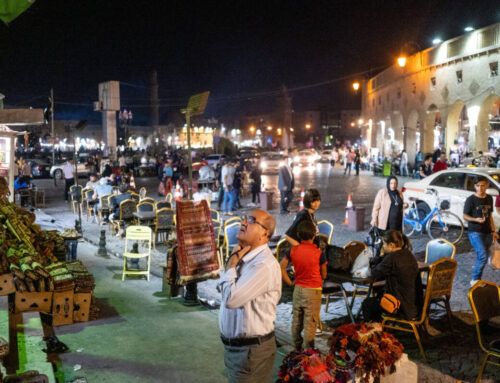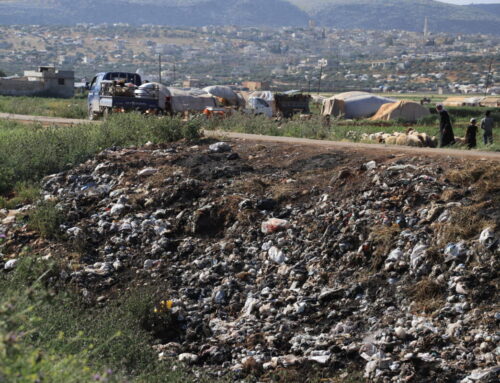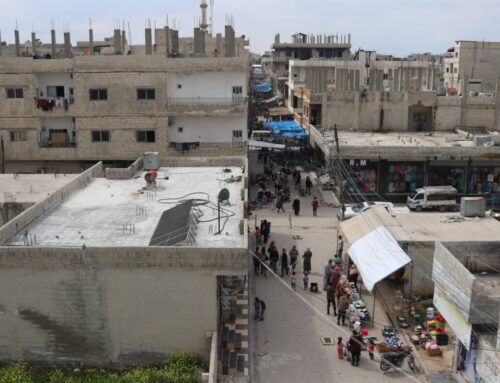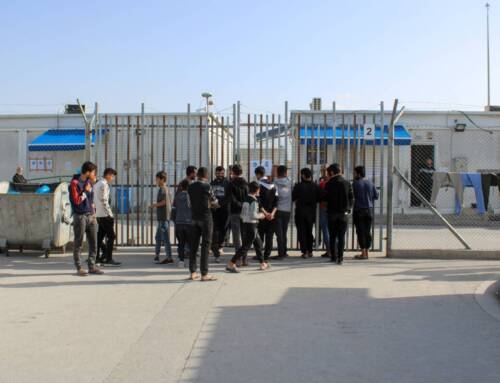‘The most expensive coffee of my life’: Syrians’ thousand-dollar entry to Egypt
Since 2013, Syrians entering Egypt must apply for a special security clearance that costs $1,050-1,500 each time. The costly requirement has limited Syrian migration to Egypt, prevented many refugees from reuniting with their relatives outside the country and birthed an opaque industry of brokers.
29 April 2024
6TH OF OCTOBER CITY/CAIRO – Twelve years after fleeing Syria, Reham* has built a life in Cairo. She holds a stable job at a Syrian hammam, and has rented and furnished her own apartment. Her children attend Egyptian schools, and she calls the country her “second home.”
Only one thing is missing for Reham to feel at peace with her new life: her mother Heba. Heba came to Egypt with Reham in 2012, but returned to Syria a short while later to care for three of her grandchildren. Their father, Reham’s brother, was arrested and disappeared in 2013—like more than 100,000 Syrians forcibly disappeared during the war, primarily by the Syrian regime.
Shortly after Heba’s return to Syria, which was meant to be temporary, politics sealed the family’s fate and split Reham and her mother apart.
In July 2013, shortly after Egypt’s first democratically elected president, Muhammad Morsi, was overthrown in a military coup, the interim government imposed a new requirement on Syrians wishing to enter Egypt: applying for a “security clearance” that recent applicants said costs between $1,050 and $1,350.
All Syrian refugees, whether coming directly from Syria or transit countries, must apply for clearance. With limited exceptions, even those like Reham, who has lived in Egypt for years, must pay to re-enter the country if they leave.
Heba has been diagnosed with liver cancer, but Reham cannot afford to visit her. Heba does not have the money to come to Cairo for treatment either, let alone a short visit. “Once you leave Egypt, you don’t come back,” Reham told Syria Direct. “Where am I going to find $1,300 to pay for the security clearance, on top of the plane ticket?”
Thousands of Syrian refugees in Egypt are in a similar position: unable to reunite with relatives abroad, even for a short visit, due to the prohibitive cost of the security clearance. Meanwhile, those who can afford the clearance are left at the mercy of an opaque network of brokers who control the process.
From the moment they apply for a visa to the first step they take on Egyptian soil, Syrians struggle through a process fraught with uncertainty and ridden with countless humiliations: a system designed to extract maximum revenues out of the despair of refugees and separated families.
‘Security clearance’ or immigration barrier?
Before 2013, Syrians could travel to Egypt without restrictions and obtain a visa on arrival, which prompted tens of thousands of Syrians to seek refuge there during the first years of the war in Syria. By July 2013, the Syrian community in Egypt had quietly ballooned to 250,000 to 300,000 people.
Refugees were initially welcomed with open arms, particularly during the short-lived rule of Muhammad Morsi, who was elected president following the 2011 Egyptian revolution. His party, the Muslim Brotherhood, had political ties to sections of the Syrian opposition leading the subsequent revolution in Syria. Morsi expressed open support for Syrian revolutionaries, whom he called “brothers” of the Egyptian people, and his government did little to stem the tide of Syrian immigration.
That changed in 2013, when Morsi was overthrown in a military coup followed by a massive crackdown against the Muslim Brotherhood and its perceived supporters. Those targeted included the Syrian community, who the new Egyptian authorities—led by Major General Abdel Fattah al-Sisi—saw as potential troublemakers. In the first six months of 2013, Syrian refugees in the country faced an intense wave of intimidation and arbitrary arrests. For the first time, authorities started to restrict immigration and crack down on those with expired residency permits.
When the new authorities introduced the security clearance system in 2013, they cited security concerns. An unnamed security source told Egyptian newspaper Al-Ahram at the time: “The regime of President Muhammad Morsi used to allow Syrian citizens to enter the country without conditions, which was causing some discomfort for the country’s security services, especially as some extremist elements tried to enter the country under the cover of fleeing the ongoing civil war in Syria.”
But 11 years later, the process remains so opaque that no one knows exactly how Egyptian security services screen applications, and on what criteria they are assessed. In practice, the overwhelming majority of requests are approved. “You don’t get rejected, it’s impossible,” one broker working for a Damascus-based “tourism company” that facilitates security clearance applications told Syria Direct. “We’ve been doing this for 10 years, and I have never seen any application get rejected.”
Syria Direct approached this broker by posing as a Syrian applying for a visa for Egypt in order to ensure the source would communicate with us like any ordinary client. When pressed for details about the process, the broker hinted that, since applicants only pay for the clearance once it is approved, Egyptian security services have little incentive to reject them.
“You are paying for this document, so no one is going to turn down the money by rejecting your application,” the Damascus-based broker said in a voice note sent over WhatsApp. A second broker, in Egypt, confirmed in a WhatsApp conversation that “instances of refusal are rare, and in such cases applicants are reimbursed.”
Ostensibly a screening tool, the clearances are also a powerful way to limit Syrian migration to Egypt. Perhaps most importantly, they provide a source of revenue for the Egyptian security branches in charge of issuing them.
It is a lucrative system that does not treat everyone equally. For example, Syrians living in Egypt on a tourist residency have to get a new clearance every time they leave and re-enter the country. Meanwhile, Syrians who have invested enough capital in Egypt to qualify for an investor visa—as well as those with permanent residency in Gulf countries, the European Union, the United States, United Kingdom or Canada—are exempted from the requirement unless they are refugees in those countries.
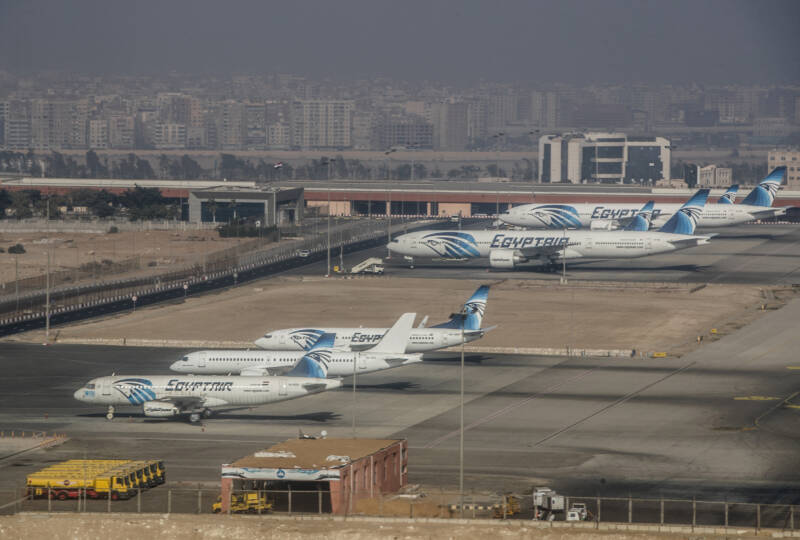
EgyptAir aircraft sit on the tarmac at Cairo International Airport, 6/1/2021 (AFP/Khaled Desouki)
An opaque process
Since its inception, the process of obtaining an Egyptian security clearance has been extremely opaque. Although the Egyptian embassy in Damascus has remained open throughout most of the war, it does not issue them. Neither do Egypt’s various consular offices abroad. Instead, applicants in both Syria and the diaspora must apply through specialized “travel offices” that take care of the paperwork and levy commissions.
This setup generates considerable confusion among Syrian refugees wishing to travel to Egypt. Che*, a 37-year-old Syrian refugee in France, told Syria Direct he applied four times for a visa through the Egyptian embassy between 2017 and 2021. He was rejected each time, before learning about the security clearance requirement, which is not clearly mentioned on Egyptian government websites.
No publicly available list of travel agencies accredited to deal with the clearance process exists, so when Che learned of the requirement he turned to social media to find one. After applying the fourth time in 2021, he was finally cleared to visit his ill mother, who lives in Egypt, for the first time in eight years.
Most of the security clearance brokers’ work happens online. This makes it extremely difficult to evaluate how many intermediary companies are on the market, understand who runs them or verify where they are actually based. Brokers advertise their services on social media, posting on Facebook groups run by and for members of the Syrian diaspora in Egypt. Some reach out directly to potential customers who ask related questions on these groups. Some use private social media accounts that do not indicate any links to travel services and agencies, while others have more formal accounts with names like “Visa for Egypt,” “Sham Travel” or “Visa SY.”
In this online chaos, some brokers offer better deals than others. “There are many people who say they can get the clearance. I normally look them up on Facebook and hunt for the most affordable price. Sometimes I can get it for $100 cheaper,” Sarah, a 28-year-old Syrian photographer who lives in western France, told Syria Direct. Since arriving in France in 2017, Sarah has traveled to Egypt three times to see her family. Her latest visit was in June 2023.
Posing as Syrians seeking to travel to Egypt, Syria Direct reached out to four brokers to inquire about the price of the process and required documents. The brokers quoted prices ranging from $1,050 to $1,500, depending on the type of clearance.
The first, known as the “fast-track clearance” or “mukhabarat clearance”—presumably because the application is approved by Egypt’s General Intelligence Service—is issued within a week and generally costs 20 million Syrian pounds (SYP), or $1,350, with some brokers charging up to $1,500.
The “slow track clearance,” also called the “public security clearance”—presumably because it is processed by the Department of Public Security, another branch of the security services—takes 10-25 days and costs SYP 18 million, or between $1,050 and $1,200, depending on the broker.
All that is required from the applicant is a copy of their travel document. One clearance broker Syria Direct contacted, through a Facebook page called “Visas to Egypt,” added that applicants are only eligible if they have not entered Egypt illegally in the past. Other brokers did not mention this requirement.
Broker fees do not include the cost of a plane ticket or a visa itself, which is obtained in Egypt upon arrival and costs between $25 and $60, depending on the visa’s duration, type and whether the applicant is traveling with a Syrian passport or a refugee travel document.
Syrians are not the only ones subjected to such a clearance system. Since the start of Israel’s offensive in Gaza, Palestinians trying to leave the strip have to pay huge “coordination” fees of up to $10,000 per person to Egyptian security branches to be added to the list of those authorized to leave. Following the outbreak of the civil war in Sudan, security clearances have also become mandatory for Sudanese travelers entering Egypt. And since 2019, Libyan workers have also faced a system of approvals and clearances issued by the Egyptian security services.
It is difficult to say just how much revenue Cairo’s security apparatus generates through this system. Considering that the Syrian population in the country rose from 300,000 in July 2013 to 1.5 million today, and assuming that all of those who arrived in the meantime paid at least $1,150 for security approval (the most common quote Syria Direct received on the lower end of the price spectrum), the income generated through the clearance business for Syrians alone would come to more than $1.38 billion over the past decade. A portion of this would go to brokers as commissions, while it is unclear where the remaining funds would flow within the Egyptian state and security services.
Notably, not every Syrian in Egypt today entered legally and some, like investors, are exempt from the clearance. Still, this estimate is likely to be on the low end, since it does not account for all the Syrian visitors who applied for clearances for temporary visits or did not settle in Egypt in the long term.
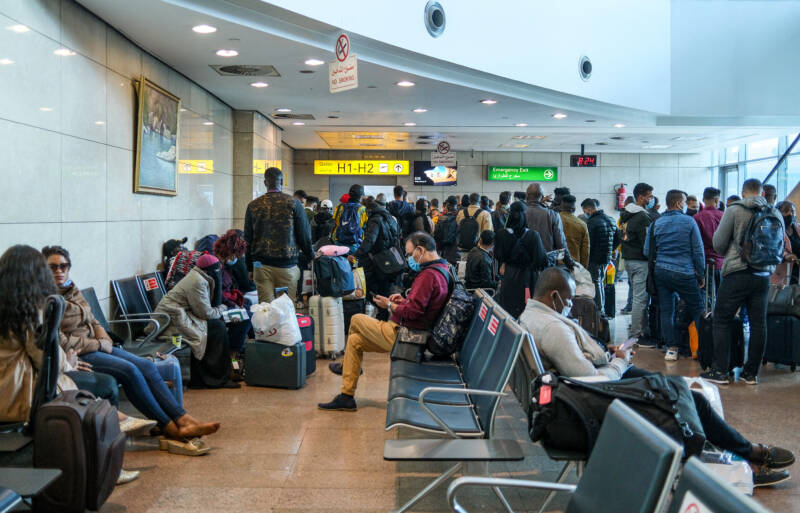
Travelers wait for security checks before a flight at Cairo International Airport, 15/1/2021 (AFP/Amir Makar)
‘They humiliate us and exploit our misery’
The opaque nature of broker networks and the fact that everything takes place remotely is a source of stress for refugees, who face a very real risk of fraud.
For example, two brokers Syria Direct spoke to requested payment in advance, raising concerns about what would happen should they disappear with the money. Like many Syrians, we engaged with these brokers—one of whom was based in Cairo and the other in Damascus—through social media, with no way to verify their real identities or seek legal help if the process fell through. Other brokers only requested payment after the clearance was approved or upon arrival to Egypt, provided that the applicant had a sponsor in Egypt who could pay on their behalf at the airport.
But even after the clearance has been issued, the stressful journey continues, riddled with humiliations, confusing procedures and hidden fees and requirements. For example, travelers must purchase their ticket to Egypt through one of two companies: SyrianAir if they are traveling from Syria, or EgyptAir if they are coming from a third country, both of which are state owned.
The clearance approval itself is unimpressive for such an expensive document. “It looks like a receipt you get after you get your groceries,” Che said. “Mine came through an unknown number via WhatsApp.” The receipt contains a unique identification number that “serves as proof of their security clearance,” according to one of the brokers. This number is meant to allow recipients through Egyptian passport control, although the process still takes hours.
Once travelers land at the airport in Egypt, they have to queue again to purchase the actual visa, which looks like a large stamp. “I have to wait by the window like others to get my actual visa for 25 euros, in addition to everything that I had already paid,” Sarah said. “They give you a visa that should be stuck on your passport, but the Egyptian officers then take it and let us wait. I waited for three hours, but I met other Syrians who had been there for six hours.”
“Every time, I feel so humiliated,” Sarah added, recalling her last visit to Egypt. “I had left my house 12 hours before landing with my five year old, who was exhausted and crying the whole time. Then we waited for hours in the airport until the officer agreed to put the stamp in our passports.” Meanwhile, “my family waited for hours in the heat outside the airport. By [the time we got out], we had all lost our excitement for my visit.”
Che felt similarly frustrated. He and Sarah boiled down their experience with Egyptian migration officials in roughly the same terms: “They humiliate us and exploit our misery.”
“My partner, who is British, got her 25 euro visa and crossed to the other side,” Che said. He had to queue in a different section, alongside different nationalities. “I asked a Malaysian person how long he waited and he said three hours,” Che recalled. “So I told a policeman that I have not seen my dying mom for eight years, and if he wanted I could slip him some euros.” Che said the policeman accepted the bribe, which he then retracted because he was worried this would attract unwanted attention.
“Eventually, he led me to a waiting room,” Che said, describing the room as a miniature version of a standard security services’ office in Egypt. There, an officer dealt with his security clearance and he could finally leave. “When I saw my mom and had a coffee with her, I told her: ‘Mom this is the most expensive coffee I have had with a girl in my entire life,’” he said. “I paid around 3,000 euros for something so simple.”
Despite what it cost him, Che was more fortunate than Reham, who still hopes to reunite with her mother before she passes away. “We hope that President al-Sisi will take pity on us and open the doors between our two countries,” she said, with tears in her eyes. “All I hope for is to collect enough money to bring my mother here.”
*Given limitations on freedom of expression in Egypt, where people are routinely arrested and prosecuted on the basis of social media posts perceived as critical of the authorities, Syria Direct has used pseudonyms for all sources in this report. This was done to allow them to share their experiences freely, without concerns for their safety.
This report is the third in a three-part series on the experiences of Syrians in Egypt. Read part 1 here and part 2 here.

